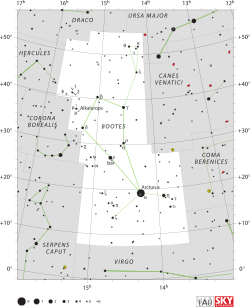40 Bootis
| 40 Bootis | |
 | |
| Observationsdata Epok: J2000.0 | |
|---|---|
| Stjärnbild | Björnvaktaren |
| Rektascension | 14t 59m 36,94745s[1] |
| Deklination | +39° 15′ 55,1994″[2] |
| Skenbar magnitud () | 5,64[3], 5,634 ± 0,009 (V)[2] |
| Stjärntyp | |
| Spektraltyp | F1 III - IV[4] |
| B–V | +0,336 ± 0,004[5] |
| Astrometri | |
| Radialhastighet () | 12,3 ± 0,7[6] km/s |
| Egenrörelse (µ) | RA: -32,109 ± 0,099[1] mas/år Dek.: 41,246 ± 0,125[1] mas/år |
| Parallax () | 19,5911 ± 0,0702[1] |
| Avstånd | 167,95[7] lå (51,49[7] pc) |
| Absolut magnitud () | 2,08[7] |
| Detaljer | |
| Massa | 1,47[8] M☉ |
| Radie | 2,35+0,34-0,13[1] R☉ |
| Luminositet | 12,20[7] L☉ |
| Temperatur | 7 070 ± 240[8] K |
| Metallicitet | -0,29[6] dex |
| Vinkelhastighet | 72,5[9] km/s |
| Ålder | 1,166[10] miljarder år |
| Andra beteckningar | |
| GSC 03044-01352, PMC 90-93 1357, UBV M 20491, AG+39 1470, HD 132772, PPM 78270, uvby98 100132772, BD+39 2820, HIC 73369, ROT 7337, WEB 12563, FK5 3182, HIP 73369, SAO 64449, Gaia DR2 1296505804661959936, GC 20183, HR 5588, SKY# 27219, GCRV 8693, IRAS 14576+3927, TD1 17878, GEN# +1.00132772, 2MASS J14593694+3915551, TYC 3044-1352-1[11] | |
40 Bootis, som är stjärnans Flamsteed-beteckning, är en ensam stjärna[12] i den mellersta delen av stjärnbilden Björnvaktaren. Den har en skenbar magnitud på ca 5,64[3] och är svagt synlig för blotta ögat där ljusföroreningar ej förekommer. Baserat på parallaxmätning inom Hipparcosuppdraget på ca 19,6[1] mas, beräknas den befinna sig på ett avstånd på ca 167 ljusår (ca 51 parsek) från solen. Den rör sig bort från solen med en heliocentrisk radiell hastighet på 12 km/s.[3]
Egenskaper
[redigera | redigera wikitext]40 Bootis är en gul till vit jättestjärna av spektralklass F1 III – IV,[10] som betecknar en åldrande stjärna på väg att utvecklas till en jätte.[9] Den har en massa som är ca 1,5[8] gånger solens massa, en radie som är ca 4[1] gånger större än solens och utsänder ca 12[7] gånger mera energi än solen från dess fotosfär vid en effektiv temperatur på ca 7 100 K.[8]
Referenser
[redigera | redigera wikitext]- Den här artikeln är helt eller delvis baserad på material från engelskspråkiga Wikipedia, 40 Boötis, 28 oktober 2019.
Noter
[redigera | redigera wikitext]- ^ [a b c d e f g] Brown, A. G. A.; et al. (Gaia collaboration) (August 2018). "Gaia Data Release 2: Summary of the contents and survey properties". Astronomy & Astrophysics. 616. A1. arXiv:1804.09365. Bibcode:2018A&A...616A...1G. doi:10.1051/0004-6361/201833051. Gaia DR2 record for this source at VizieR.
- ^ [a b] ”Basic data: * 40 Boo – High proper-motion Star” (på engelska). Centre de Données astronomiques de Strasbourg. http://simbad.u-strasbg.fr/simbad/sim-basic?Ident=40+Boo&submit=SIMBAD+search. Läst 30 juni 2019.
- ^ [a b c] Anderson, E.; Francis, Ch. (2012), "XHIP: An extended hipparcos compilation", Astronomy Letters, 38 (5): 331, arXiv:1108.4971, Bibcode:2012AstL...38..331A, doi:10.1134/S1063773712050015.
- ^ Boro Saikia, S.; et al. (2018), "Chromospheric activity catalogue of 4454 cool stars. Questioning the active branch of stellar activity cycles", Astronomy and Astrophysics, 616: A108, arXiv:1803.11123, Bibcode:2018A&A...616A.108B, doi:10.1051/0004-6361/201629518.
- ^ van Leeuwen (2007). ”Hipparcos, the New Reduction” (på engelska). http://vizier.u-strasbg.fr/viz-bin/VizieR-5?-out.add=.&-source=I/311/hip2&HIP=73369. Läst 30 juni 2019.
- ^ [a b] Casagrande, L.; et al. (2011), "New constraints on the chemical evolution of the solar neighbourhood and Galactic disc(s). Improved astrophysical parameters for the Geneva-Copenhagen Survey", Astronomy and Astrophysics, 530: A138, arXiv:1103.4651, Bibcode:2011A&A...530A.138C, doi:10.1051/0004-6361/201016276.
- ^ [a b c d e] ”40 Boötis” (på engelska). Universe Guide. https://www.universeguide.com/star/40bootis. Läst 30 juni 2019.
- ^ [a b c d] David, Trevor J.; Hillenbrand, Lynne A. (2015), "The Ages of Early-Type Stars: Strömgren Photometric Methods Calibrated, Validated, Tested, and Applied to Hosts and Prospective Hosts of Directly Imaged Exoplanets", The Astrophysical Journal, 804 (2): 146, arXiv:1501.03154, Bibcode:2015ApJ...804..146D, doi:10.1088/0004-637X/804/2/146.
- ^ [a b] Schröder, C.; et al. (January 2009), "Ca II HK emission in rapidly rotating stars. Evidence for an onset of the solar-type dynamo" (PDF), Astronomy and Astrophysics, 493 (3): 1099–1107, Bibcode:2009A&A...493.1099S, doi:10.1051/0004-6361:200810377
- ^ [a b] ESA (1997), The HIPPARCOS and TYCHO catalogues. Astrometric and photometric star catalogues derived from the ESA HIPPARCOS Space Astrometry Mission, 1200, Noordwijk, Netherlands: ESA Publications Division, Bibcode:1997ESASP1200.....E.
- ^ "40 Boo". SIMBAD. Centre de données astronomiques de Strasbourg. Hämtad 12 maj 2019.
- ^ Eggleton, P. P.; Tokovinin, A. A. (September 2008), "A catalogue of multiplicity among bright stellar systems", Monthly Notices of the Royal Astronomical Society, 389 (2): 869–879, arXiv:0806.2878, Bibcode:2008MNRAS.389..869E, doi:10.1111/j.1365-2966.2008.13596.x.





